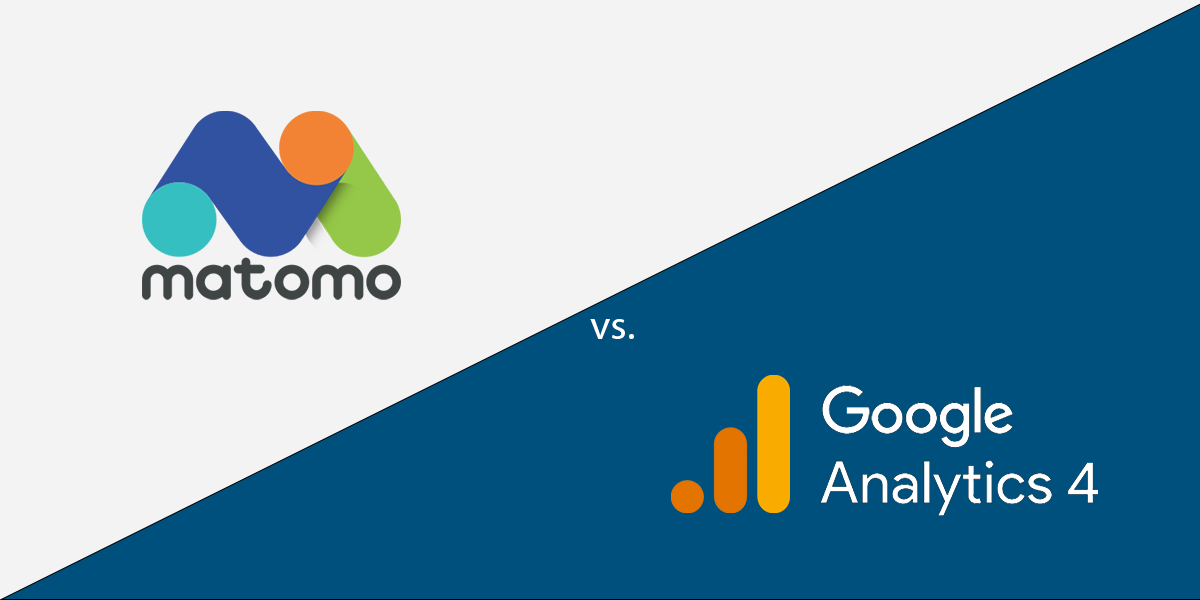Google Analytics 4 vs. Matomo Analytics

As Google itself announced that they’ll begin turning down Universal Analytics by July 1, 2023 there was great confusion in the market and companies are uncertain on how to proceed. Within this blog post we want to explain the most common terms, compare Google Analytics 4 to Matomo Analytics and inform companies about their choices.
- What is Matomo Analytics?
- Google Analytics history
- What is Google Analytics 4?
- Google Analytics 4 vs. Matomo Analytics
- Summary
First things first - we’ll give you a short explanation about the different tools and terms.
Matomo Analytics
Matomo, formally known as “Piwik”, has been in the market since 2007. It is an open-source web analytics platform that focuses on 100% data ownership, customer privacy and GDPR-compliance. Matomo is used by over 1.4 million websites in more than 190 countries and is the most popular alternative to GA.
Source: Matomo Analytics - The Google Analytics alternative that protects your data
To better understand Google's shift here is a quick history about their famous web analytics tool:
Google Analytics: The very first instance of Google Analytics which was published in 2005.
Universal Analytics (UA): The new and improved version of Google Analytics which came out in 2012 and became the default property type. This version will be turned off by July, 2023.
Google Analytics 4: This is the latest version of Google Analytics which came out October, 2020. It follows a different tracking approach than the previous versions and will be Googles main analytics product in the future.
Google Analytics 4 (GA4)
GA4 has shifted its focus from user tracking towards user journey tracking (visit to final conversation). Google self-describes it as a new approach to “privacy-first” tracking, cross-channel data and AI based predictive data all at once. Here are the most important features:
- Collects both website and app data to better understand the customer journey
- Uses events instead of session-based data
- Includes privacy controls such as cookieless measurement, and behavioral and conversion modeling
- Predictive capabilities offer guidance without complex models
- Direct integrations to media platforms help drive actions on your website or app
Source: Introducing Google Analytics 4 (GA4) - Analytics Help
Google Analytics 4 vs. Matomo Analytics (July 2022)
To help your company choose the right tool we would like to share this table about the benefits- and drawbacks with you. Please note that this is just a summary and your choice can also depend on factors which are not covered here.
| Tool | Advantages | Disadvantages |
| Matomo Analytics | - Open source with a community to support you - 100% ownership of the data with servers based in the EU - Native option to comply with European cookie policy - Compliance with GDPR - Easy to use interface - Advanced behavioural analytics (heatmaps, session recordings, form analytics, etc.) - Import of historical Universal Analytics data possible | - Costs for setup (if you are not technically skilled to do it yourself) - Monthly subscription model - It does not allow you to cross data with a secondary dimension / e.g. app data |
| Google Analytics 4 | - Combined cross-channel data from website and app - Insights and recommendations based on machine learning | - Really complex to set it up in an GDPR-compliant way and follow EU-cookie laws. - Googles data processing terms and general Privacy Shield 2.0. negotiations are ongoing and seen critical by a lot of EU-countries. - Data are transferred to severs in the United States and owned by Google - Cost for setup (if you are not technically skilled to do it yourself) - Import of historical Universal Analytics data not possible - Data sampling when customer didn’t agreed to cookie consent which can result in inaccurate data |
Summary
At the end of the day, the worst thing an organization can do is nothing. Waiting until July 2023 to migrate to a new web analytics platform would be very disruptive and costly.
If GDPR, privacy and data ownership are a determining factor, we have a clear winner: Matomo. If you’re running on a tight budget, don't have visitors/customers in EU, we recommend creating a GA4 property alongside your existing UA property and start gathering data with Google's new tracking approach.
Contact our web analytics project manager Nina Holzapfel for further information and guidance. Ramsalt can help you the setup, hosting, customization and training of these web analytics tools to gain valuable insights and optimize your products/user journeys.
Latest news
The public sector is overflowing with knowledge – from reports to evaluations. The challenge has long been to find this information in the sea of PDFs. Ramsalt has been central to the development of Kudos – a national knowledge portal. By implementing groundbreaking AI-based document analysis, we have helped turn a chaotic document base into a goldmine of searchable insight.

Ramsalt’s Client Resource Manager, Nina Holzapfel, will speak at DrupalCon 2025 about how to manage scope creep and keep projects on track. With years of experience leading Drupal projects and keeping clients happy, she shares practical insights for teams who want smoother delivery and stronger results. In this interview, Nina explains why this topic matters and what attendees can expect from her session.

DrupalCon Vienna 2025 is almost here. Ramsalt Labs is ready to join the global Drupal community to share insights, contribute, and connect. This event is a chance for us to strengthen Drupal, learn from peers, and meet face to face with clients, partners, and colleagues.

Ramsalt Lab, one of Northern Europe’s leading web development agencies, is pleased to announce a new phase of growth with strategic changes to its leadership team.




